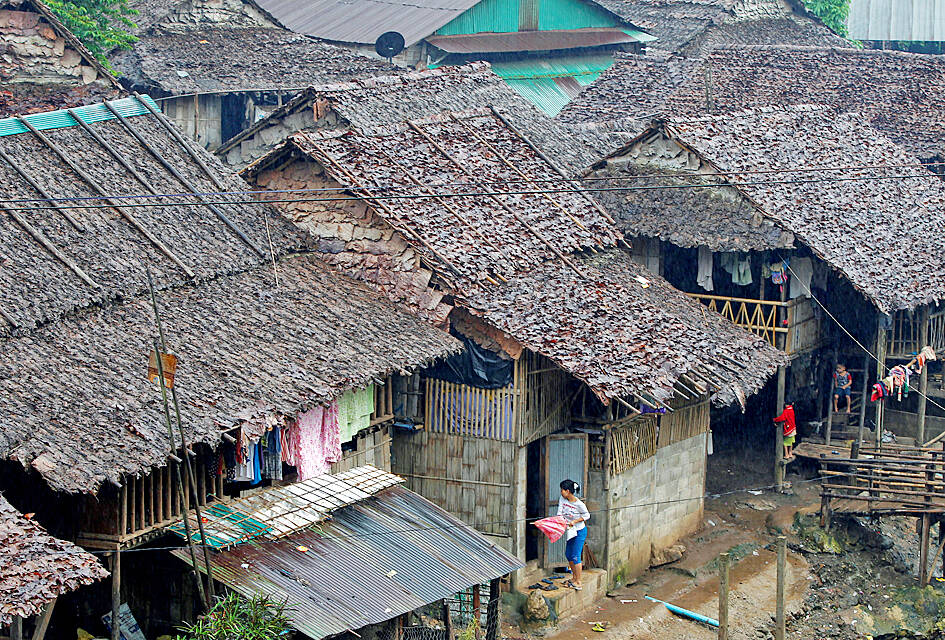Healthcare centers serving tens of thousands of refugees on the Thai-Myanmar border have been ordered shut after US President Donald Trump froze most foreign aid last week, forcing Thai officials to transport the sickest patients to other facilities.
The International Rescue Committee (IRC), which funds the clinics with US support, told the facilities to shut by tomorrow, a local official and two camp committee members said.
The IRC did not respond to a request for comment.

Photo: Reuters
Trump last week paused development assistance from the US Agency for International Development for 90 days to assess compatibility with his “America First” policy.
The freeze has thrown the global aid sector, which is heavily funded by the US, into chaos.
It was not immediately clear what impact a waiver for life-saving humanitarian assistance during the 90-day pause issued by the US Department of State on Tuesday would have, or how many centers across the nine camps housing about 100,000 people were impacted.
The health facilities on the border serve tens of thousands of refugees from conflict-torn Myanmar.
Bweh Say, a member of the refugee committee at Mae La camp, in Tha Song Yang district, and a local schoolteacher yesterday said the IRC had already discharged patients and stopped people, including pregnant women and people with breathing difficulties dependent on oxygen tanks, from using their equipment and medicine.
The camp’s water distribution and garbage disposal systems, which the organization had also been helping with, were also affected, they said.
Relatives of some of those who were discharged were “trying to find oxygen tanks” to bring home, Bweh Say said.
About 50 patients had been discharged, while several severely ill patients remained in the Mae La hospital, including a child recovering from heart surgery, the schoolteacher said, declining to be named, because they were not authorized to speak publicly.
“Normally that hospital receives about 100 out-patients per day and now none,” the teacher said.
Tak Provincial Governor Chucheep Pongchai told Thai media that the most severely ill patients would be transferred to local state hospitals, adding that officials have asked the IRC for use of their equipment.
Tha Song Yang hospital director Tawatchai Yingtaweesak said he was traveling to the camp to assess patients.
“We have to assess which patients can go home, which patients need help with oxygen and so on,” he said by telephone.
Nai Aue Mon, the program director of the Human Rights Foundation of Monland, a grassroots organization in southern Myanmar, said there was growing concern that basic healthcare needs in the camps would go unmet.
“It’s scary because these refugees depend entirely on this assistance for their day-to-day health services,” Nai Aue Mon said.

POLITICAL PRISONERS VS DEPORTEES: Venezuela’s prosecutor’s office slammed the call by El Salvador’s leader, accusing him of crimes against humanity Salvadoran President Nayib Bukele on Sunday proposed carrying out a prisoner swap with Venezuela, suggesting he would exchange Venezuelan deportees from the US his government has kept imprisoned for what he called “political prisoners” in Venezuela. In a post on X, directed at Venezuelan President Nicolas Maduro, Bukele listed off a number of family members of high-level opposition figures in Venezuela, journalists and activists detained during the South American government’s electoral crackdown last year. “The only reason they are imprisoned is for having opposed you and your electoral fraud,” he wrote to Maduro. “However, I want to propose a humanitarian agreement that

Young women standing idly around a park in Tokyo’s west suggest that a giant statue of Godzilla is not the only attraction for a record number of foreign tourists. Their faces lit by the cold glow of their phones, the women lining Okubo Park are evidence that sex tourism has developed as a dark flipside to the bustling Kabukicho nightlife district. Increasing numbers of foreign men are flocking to the area after seeing videos on social media. One of the women said that the area near Kabukicho, where Godzilla rumbles and belches smoke atop a cinema, has become a “real

‘POINT OF NO RETURN’: The Caribbean nation needs increased international funding and support for a multinational force to help police tackle expanding gang violence The top UN official in Haiti on Monday sounded an alarm to the UN Security Council that escalating gang violence is liable to lead the Caribbean nation to “a point of no return.” Special Representative of the UN Secretary-General for Haiti Maria Isabel Salvador said that “Haiti could face total chaos” without increased funding and support for the operation of the Kenya-led multinational force helping Haiti’s police to tackle the gangs’ expanding violence into areas beyond the capital, Port-Au-Prince. Most recently, gangs seized the city of Mirebalais in central Haiti, and during the attack more than 500 prisoners were freed, she said.

DEMONSTRATIONS: A protester said although she would normally sit back and wait for the next election, she cannot do it this time, adding that ‘we’ve lost too much already’ Thousands of protesters rallied on Saturday in New York, Washington and other cities across the US for a second major round of demonstrations against US President Donald Trump and his hard-line policies. In New York, people gathered outside the city’s main library carrying signs targeting the US president with slogans such as: “No Kings in America” and “Resist Tyranny.” Many took aim at Trump’s deportations of undocumented migrants, chanting: “No ICE [Immigration and Customs Enforcement], no fear, immigrants are welcome here.” In Washington, protesters voiced concern that Trump was threatening long-respected constitutional norms, including the right to due process. The